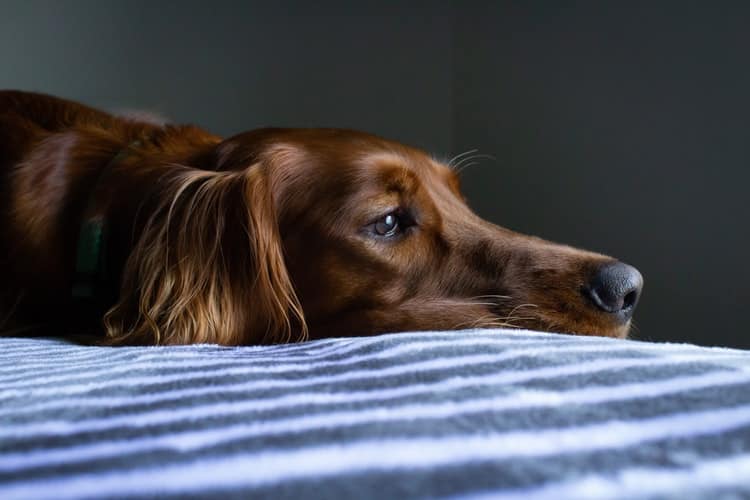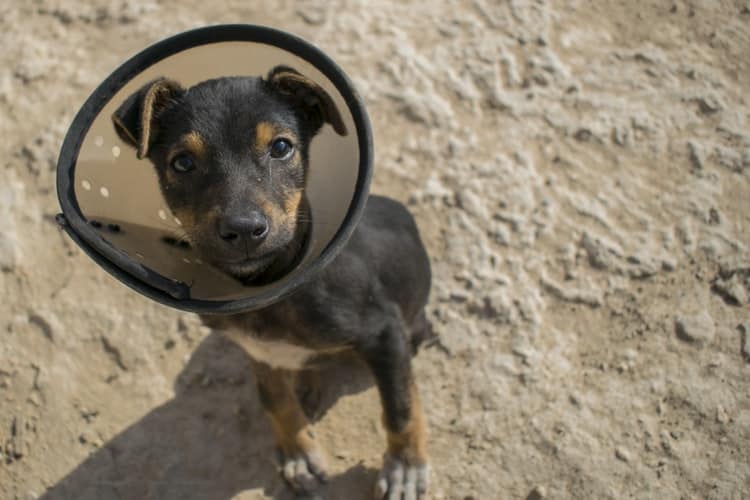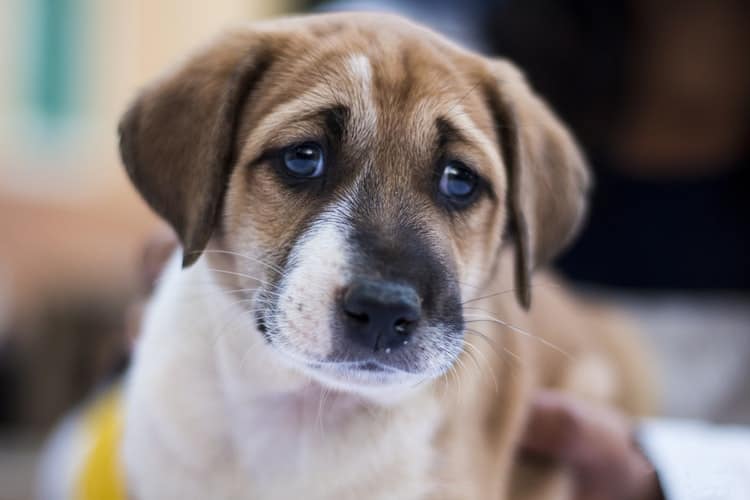Getting your dog spayed is an important duty for any pet owner. Just like with any operation, there’s always some pain to deal with afterward; even in animals. However, you may be wondering what signs of pain are normal after spaying.
Is it normal for dogs to whine after being spayed? Is it normal for dogs to whimper after being spayed? Answering these sorts of questions can help you and your dog experience a calmer recovery.
Contents
Is It Normal for Dogs to Whine After Being Spayed?
It’s perfectly normal for dogs to whine after being spayed. Some amount of pain is normal for dogs that have been spayed immediately following their procedure. While some dogs can tolerate pain more than others, don’t be surprised if a dog is whining a week after spay.

Is it normal for a dog to moan after surgery? Dogs won’t be able to tell you how they feel after being spayed, yet there are still ways for you to know if she’s feeling any pain.
How Do I Know if My Dog is in Pain After Spaying?
Your dog may not feel pain or discomfort until after the anesthesia has worn off. They may feel tired and agitated after you bring them home from the vet. Dogs will have some pain after being spayed, and how they express the pain will reflect how they feel.
Some dogs may show some, or all of, the signs below which indicate that they’re in pain:
- Dog crying all night after spay
- Whining or whimpering
- Biting or licking at the incision site
- Resisting being held
- Not wanting to get up
- Not wanting to eat
These are normal signs after being spayed. If your dog refuses to eat after the first day, contact your vet and let them know. Contact your vet if you are unwilling to get up after the first day.
How long your dog will be in pain after spaying depends on how quickly the incision heals. Most incisions will heal within 2 weeks. Your dog will feel the most pain within the first few days, which is why a dog whining 3 days after spay is normal.
If your dog is still in pain, talk to your veterinarian. They can prescribe pain relievers if they haven’t already. Never give your dog pain relievers intended for humans.
How to Comfort a Dog After Spaying
Aside from pain, your dog may feel sleepy, agitated, and might not be able to balance. There are ways that you can help them feel comfortable so they can have an easy recovery.

Buy an Elizabeth Collar
Most dogs will chew or lick at their incision due to pain or itchiness once it starts to heal. This can cause an infection of the wound or even cause it to open. This is costly to fix, and it ends up causing more pain to your dog.
In this case, you can buy an e-collar that will go around your dog’s head and prevent them from touching the incision. These collars can be very annoying to a dog and make it hard to eat, drink and see what’s below them.
However, different designs can be less irritating. You can look for inflatable designs that won’t go around the head and prevent your dog from touching its wound.
Put Your Dog in a Separate Room
Your dog will be easily agitated, tired, and in pain coming back from the clinic. They will need to sleep off the pain. Having your dog rest in a separate room away from loud noises and small children can help them sleep easier.
Make sure the room has a low level that she can jump onto. Too much activeness can allow the wound to open. It helps to make them a long, rectangular-shaped bed so they won’t be curled up. The incision site will be on the abdomen, so rolling into a ball might not allow it to heal correctly.
Keep Your Dog Inside For a Few Days
You will want to restrict her activity for the first few days so that she won’t disturb her stitches. Going for a slow short potty walk is okay; just make sure to take it easy.
How Does a Dog Act After Being Spayed?
Once the pain has subsided, and the wound has healed, your dog will feel less agitated and likely return to their usual self. These are also typical female dog behavior after spaying.

- Less urinating: When a female dog is in heat, she will want to get the attention of male dogs. She does this by frequently urinating and in as many spots as she can, to lead male dogs to find her. Spaying your dog can stop this habit because she will no longer be in heat.
- Less aggressiveness: A female dog may be aggressive with other people or other dogs before being spayed. Female dogs tend to fight with one another over male dogs when in heat. Spaying your dog will eliminate this problem. Female dogs also tend to be protective of their puppies and this may make them aggressive towards people. Likewise, a female dog can feel this way if she is not able to get pregnant.
- Less running away: When a female dog is in heat, she has the need to go out and search for mates. This makes her more vulnerable to running out the door every time it’s open. She may get lost, injured, or even killed. Spaying a dog takes this feeling away and allows your dog to be calmer.
- Less pain during ovulation: A female dog may feel pain with each ovulation cycle. You might find that your dog gets irritated at times and not know why. Spaying your dog will completely remove this irritability because she will no longer ovulate.
These changes might not be seen in all dogs who have been spayed. Some older dogs will hold on to these habits. It’s best to get your dog spayed within the first 12 months of their life. This will enable them from feeling this way or displaying these habits.
What’s The Difference Between Spaying And Neutering?
Spaying and neutering are sometimes referred to as “fixing” pets by veterinarians and pet owners. Each procedure results in the sterilization of the pet, preventing unwanted pregnancies.
The primary distinguishing factor between spaying and neutering is sex. Male dogs are neutered, while female dogs are spayed. While the result is the same for both male and female dogs, it’s important to note that the procedure is entirely different.
Is It Normal For Dogs to Whine After Neutering?
So, what about male dogs? Is it normal for them to whine after a neuter surgery? Following a general anesthetic, some dogs cry and whimper quite loudly. Neutered dogs usually feel some degree of discomfort immediately following their procedure.
It is not unusual for your dog to whine or whimper after being neutered, although some dogs can tolerate pain more than others. A dog’s whining after neutering is completely normal. Your dog is probably okay if he is eating, drinking, walking, and going to the bathroom without any problems. He may be a bit wobbly or sleepy the day of the procedure as the anesthetic wears off over the next 24 hours.
Neuter surgeries cause temporary discomfort that lasts just a few days and should disappear after a week. If your dog seems to be experiencing any pain or discomfort for more than a couple of days, it’s a good idea to contact me for further advice.
Related Questions
How Long Will My Dog Whine After Surgery?
Your dog may whine overnight or for a few days until it feels pain. If the whining continues for weeks, it could be one of the warning signs after spaying a dog, and you should consult your vet about it.
How Long Does a Dog Feel Pain After Being Spayed?
Your dog will feel the most pain within the week after surgery. A dog whining 5 days after spay is common because the recovery period varies depending on the dog’s health and treatment.
Why Is My Dog Whining So Much After Surgery?
A dog may whine so much after surgery due to pain, reaction to anesthesia, or confusion. Some dogs may suffer from anxiety or experience a side effect of medication, causing them to whine longer.
Conclusion
Remember that pain is normal after a dog has been spayed, however, you know your dog best, and if you feel that the way she’s acting is unusual contact your vet’s office right away. They should be able to reassure you over any worries you may have.
